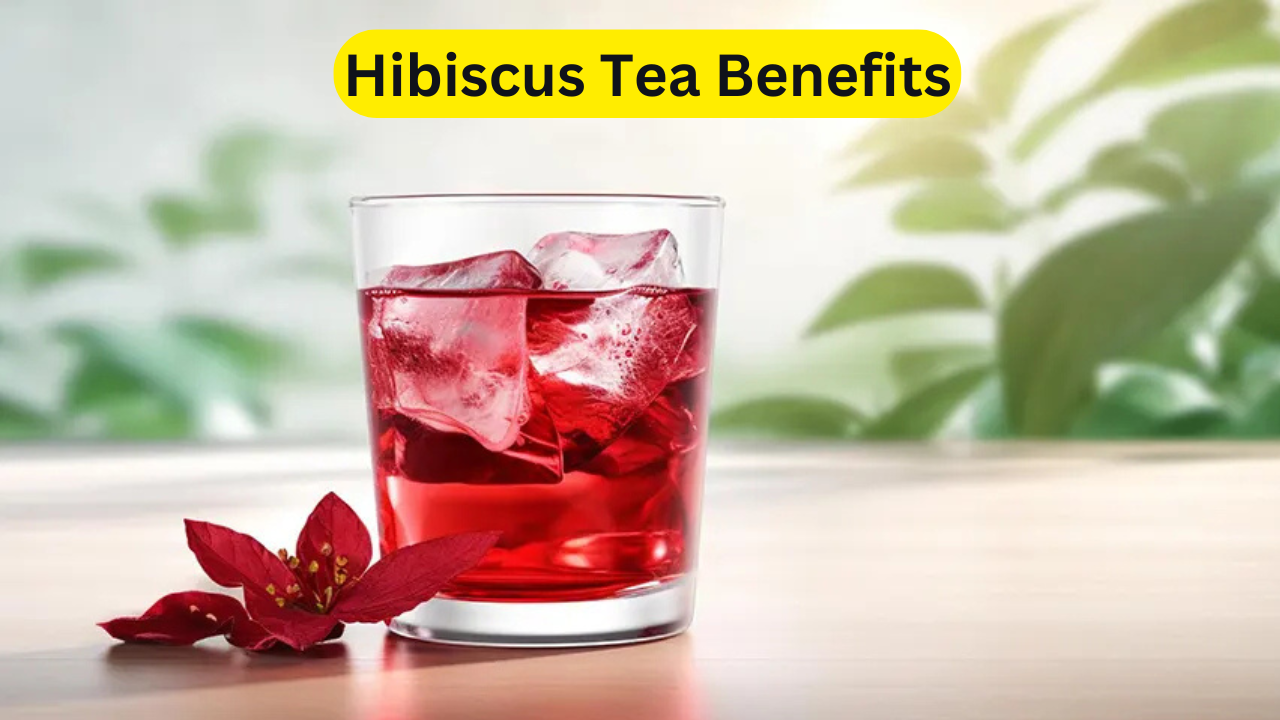Hibiscus Tea Benefits: Hibiscus tea, made from the deep red flowers of the Hibiscus plant, is a popular herbal drink known for its sweet-tart flavor and vibrant color. It has been consumed for centuries in various cultures, especially in warm climates, for its potential health benefits. As research into its medicinal properties expands, hibiscus tea is being recognized for its potential to support heart health, aid weight management, and even help manage blood sugar levels. Packed with antioxidants and polyphenols, hibiscus tea is not only refreshing but may also provide a range of therapeutic effects.
While hibiscus tea offers promising health benefits, it is important to consider its risks and possible side effects. As with any herbal remedy, it’s essential to understand the implications it may have on your health, especially if you are pregnant, breastfeeding, or taking medications. Before incorporating hibiscus tea into your routine, it’s advisable to consult with a healthcare provider, particularly if you have pre-existing health conditions. This article will explore the benefits, nutrition, potential side effects, and risks of hibiscus tea, giving you a comprehensive understanding of this beloved herbal drink.
Hibiscus tea is primarily derived from the calyx of the hibiscus flower, which is the protective part surrounding the flower itself. There are two primary species of hibiscus used to make tea: Hibiscus sabdariffa and Hibiscus rosasinensis. Hibiscus sabdariffa is the variety most often researched and associated with health benefits. It is also the variety known for its strong antioxidant properties, which may contribute to its potential therapeutic effects. Despite its popularity, there are still many unknowns, and more research is needed to conclusively determine how hibiscus tea can best be used for health purposes.
Hibiscus Tea Benefits What is Hibiscus Tea?
Hibiscus tea is made by steeping dried hibiscus flowers in hot water, resulting in a bright red beverage with a tart, slightly sour taste. Known for its high vitamin C content and rich polyphenols, hibiscus tea has become a favorite for people seeking a healthy alternative to sugary beverages. Its natural tartness makes it similar to cranberry juice, yet it has a distinct floral flavor that many people find refreshing.
Hibiscus tea is traditionally consumed in various parts of the world, from Africa to Latin America and the Caribbean, where it is often enjoyed cold as a refreshing beverage in the hot climate. In addition to being a flavorful drink, hibiscus tea has been linked with several health benefits, from improving cardiovascular health to assisting in weight management. As interest in herbal teas grows, hibiscus tea has gained significant attention for its potential therapeutic properties, making it a popular choice among health-conscious consumers.
Health Benefits of Hibiscus Tea
1. Lowering Blood Pressure
One of the most well-known benefits of hibiscus tea is its potential to help lower blood pressure. Studies have suggested that hibiscus tea can significantly reduce both systolic and diastolic blood pressure in individuals with mild to moderate hypertension. According to a 2020 review of seven trials, hibiscus tea made from Hibiscus sabdariffa has a noteworthy effect on lowering blood pressure. However, further research is needed to confirm whether the same benefits apply to Hibiscus rosasinensis.
For people with high blood pressure, hibiscus tea may be an effective natural remedy to complement other treatments. However, anyone with a history of low blood pressure should exercise caution, as hibiscus tea may further reduce blood pressure, which could be harmful.
Click Here: A Workout Before Bedtime May Improve Your Sleep Quality: The Science Behind It
2. Reducing Bad Cholesterol (LDL)
Hibiscus tea has also been found to have a positive impact on cholesterol levels. A 2021 review of 39 studies concluded that hibiscus tea could help lower low-density lipoprotein (LDL) cholesterol, also known as “bad” cholesterol. Excess LDL cholesterol in the bloodstream is a significant risk factor for cardiovascular disease. By reducing LDL cholesterol, hibiscus tea may contribute to heart health and help prevent heart disease. However, more studies are needed to determine the full extent of its effectiveness in cholesterol management.
3. Blood Sugar Management
In addition to its impact on cholesterol, hibiscus tea has been shown to help regulate blood sugar levels. Research published in 2020 indicated that Hibiscus sabdariffa tea could significantly lower fasting blood glucose levels. This makes hibiscus tea a potential natural remedy for individuals with diabetes or those at risk of developing it. Furthermore, the 2021 review on Hibiscus rosasinensis tea also suggested anti-diabetic effects, highlighting its potential for controlling blood sugar levels in people with diabetes.
4. Weight Management
Recent studies have suggested that hibiscus tea may aid in weight management. A 2023 meta-analysis revealed that a combination of Hibiscus sabdariffa and other plant extracts might promote weight loss, particularly in individuals with obesity. The tea could play a role in managing metabolic syndrome—a group of conditions that increase the risk of type 2 diabetes, heart disease, and stroke. However, experts note that more research is necessary to confirm these claims and determine whether hibiscus tea can effectively assist in weight loss.
5. Hormone Balance and Menstrual Support
In traditional Mexican medicine, Hibiscus rosasinensis is used to treat premenstrual syndrome (PMS) and menopause symptoms. This is due to the presence of phytoestrogens in the tea, which mimic estrogen in the body. While research on this use is limited, some believe that drinking hibiscus tea may help alleviate symptoms associated with hormonal imbalances, such as bloating, mood swings, and hot flashes. However, more studies are required to fully understand how hibiscus affects hormonal balance.
Nutritional Value of Hibiscus Tea
Hibiscus tea is naturally calorie-free and caffeine-free, making it an excellent choice for those looking to reduce their calorie intake or avoid caffeine. In addition, hibiscus tea contains small amounts of essential minerals such as:
- Calcium
- Magnesium
- Phosphorus
- Potassium
The polyphenols found in hibiscus, including anthocyanins, are powerful antioxidants that help protect the body from oxidative stress. Antioxidants play a crucial role in neutralizing free radicals and reducing inflammation, which may support overall health.
Side Effects and Risks of Hibiscus Tea
While hibiscus tea is generally considered safe for most people, it may cause side effects in some individuals. These include:
- Upset Stomach: Some people may experience digestive discomfort, including gas or bloating.
- Allergic Reactions: Although rare, some individuals may be allergic to hibiscus, leading to symptoms such as itching, swelling, or difficulty breathing.
- Drug Interactions: Hibiscus tea may interact with certain medications, including acetaminophen and diuretics. People taking these medications should consult with a healthcare provider before consuming hibiscus tea regularly.
Pregnancy and Lactation Concerns

Due to the phytoestrogens in hibiscus, pregnant women should exercise caution, as it may affect hormone levels. There are no definitive studies on the safety of hibiscus tea during pregnancy, so it’s best to avoid it unless cleared by a healthcare provider. Additionally, breastfeeding mothers should consult a doctor before drinking hibiscus tea, as there is insufficient evidence on its effects during lactation.
Liver Concerns
Some studies have indicated that high doses of hibiscus extract may affect liver function. However, these effects have been observed in animal studies with higher concentrations than those typically found in hibiscus tea. Nonetheless, it’s important to consume hibiscus tea in moderation and consult a healthcare provider if you have liver issues.
Also Read: Cadillac CT4 and CT5 Might Be Replaced by EVs: What We Know So Far
Hibiscus Tea Benefits Conclusion
Hibiscus tea offers numerous potential health benefits, from lowering blood pressure and cholesterol to supporting weight management and blood sugar control. It’s also packed with antioxidants that can protect the body from oxidative stress. Despite its many benefits, hibiscus tea also carries some risks, particularly for people with certain health conditions, those on medication, or those who are pregnant. Before incorporating hibiscus tea into your routine, it’s essential to weigh both the benefits and risks.
As research continues to explore the full potential of hibiscus tea, it’s clear that this herbal beverage has a place in the realm of natural remedies. However, it’s always best to consult a healthcare provider before making it a regular part of your diet, especially if you have underlying health conditions.
Hibiscus Tea Benefits FAQs
- What is hibiscus tea made from? Hibiscus tea is made from the dried flowers of the hibiscus plant, specifically the calyx, which is the part that surrounds the flower. The most common species used for tea is Hibiscus sabdariffa.
- Can hibiscus tea help with blood pressure? Yes, several studies have shown that hibiscus tea can help lower blood pressure, particularly for individuals with mild to moderate hypertension. However, further research is needed to fully understand its effects.
- Are there any side effects of hibiscus tea? While hibiscus tea is generally safe, some people may experience an upset stomach or allergic reactions. It’s also known to interact with certain medications, so it’s advisable to consult a doctor before drinking hibiscus tea regularly.
- Can hibiscus tea help with weight loss? Some studies suggest that hibiscus tea, especially when combined with other plant extracts, may aid in weight loss and managing metabolic syndrome. However, more research is required to confirm these effects.
- Is hibiscus tea safe during pregnancy? Due to its phytoestrogen content, it’s recommended that pregnant women avoid hibiscus tea unless given the green light by a healthcare provider. There is insufficient research on its safety during pregnancy.









